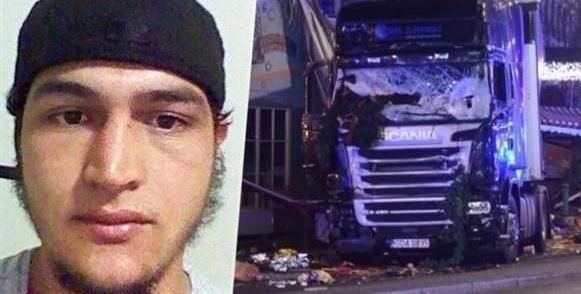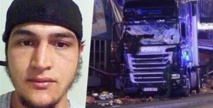Amri, a 24-year-old Tunisian, is believed to have hijacked a lorry and used it to mow down holiday revellers at the market on Monday, killing 12 and wounding dozens more.
"We can be relieved at the end of this week that the acute danger is over," Merkel told reporters.
"However the danger of terrorism in general endures, as it has for several years. We all know that."
The Islamic State jihadist group has claimed responsibility and released a video Friday in which Amri is shown pledging allegiance to IS chief Abu Bakr al-Baghdadi.
He had been missing since escaping immediately after the attack, but his time on the run was cut short thanks to a combination of luck and the quick reflexes of rookie Italian police officer Luca Scata.
The 29-year-old, still officially a trainee, shot the Tunisian twice after he had fired on his patrol partner, Christian Movio, 36.
The officers had stopped Amri in the early hours of Friday, near Milan's Sesto San Giovanni train station. They had no idea of who they were dealing with.
"He was completely calm, they asked him to empty his backpack and with a sudden movement he pulled out the pistol, which was loaded and ready to use," said Roberto Guida, the neighbourhood police head.
Police said Amri had initially tried to pass himself off as being from southern Italy and had shouted "bastard police" in Italian before opening fire.
Amri's death came as German police arrested two brothers on suspicion of planning to attack a shopping mall, while authorities in both Australia and Indonesia reported that Christmas terror plots had been foiled.
- 'Raises questions' -
German authorities are investigating whether Amri was part of a "network" with accomplices still at large.
While Merkel hailed the cooperation of the European security services in neutralising him, she admitted a need for reform.
"The Amri case raises questions -- questions that are not only tied to this crime but also to the time before, since he came to Germany in July 2015" from Italy," she said.
"We will now intensively examine to what extent official procedures need to be changed."
Germany's anti-migration AfD party, which has blamed Merkel's liberal asylum policy for the attack, surged to a year high of more than 15 percent in a poll, ahead of a general election expected next September.
Amri's port of entry to Europe was Italy, arriving on a migrant boat in 2011, and spending four years in prison there afterwards.
Convicted for starting a fire in a refugee centre, he served out his sentence until 2015, then made his way to Germany, taking advantage of continental Europe's Schengen system of open borders -- as he did on his return to Italy this week.
Milan police chief Antonio De Iesu said Amri had arrived in Italy from Germany via France. He had no telephone on him and only a few hundred euros.
German police said they found his fingerprints and his temporary residence permit in the cab of the truck used in the Berlin attack, next to the body of its registered Polish driver, who was killed with a gunshot to the head.
A 100,000-euro ($104,000) reward had been offered for information leading to Amri's arrest.
- 'Lot went wrong' -
But prominent politicians in Germany and Italy warned that lessons had to be learned from mistakes that might have contributed to Amri being able to carry out his attack.
The Tunisian had been on the radar of anti-terrorism agencies in both countries following his apparent radicalisation in prison.
Amri had been monitored since March, suspected of planning break-ins to raise cash for automatic weapons to carry out an attack -- but the surveillance was stopped in September because Amri was seen primarily as a small-time drug dealer.
Beppe Grillo, leader of Italy's biggest opposition party, the Five Star Movement, said the Schengen open borders system should have been suspended after the attack and needed an overhaul.
"Italy is becoming a crossroads for terrorists that we are not able to identify and alert people about, and they are able to spread all over Europe thanks to Schengen," he said.
"Those entitled to asylum in Italy can stay, but all the other illegals need to be repatriated immediately, starting from today."
Meanwhile Movio, the officer shot by Amri, underwent successful surgery later Friday to repair the damage to his shoulder and was able to joke with visitors at his hospital bed.
"I'm happy to have been useful," he said.
In Berlin, hundreds flocked to a memorial concert at the Brandenburg Gate under the banner "Together Berlin", as Christmas markets in the capital reported brisk business, many under tighter security.
-------------------------------------------------------------------------------------------------------------
"We can be relieved at the end of this week that the acute danger is over," Merkel told reporters.
"However the danger of terrorism in general endures, as it has for several years. We all know that."
The Islamic State jihadist group has claimed responsibility and released a video Friday in which Amri is shown pledging allegiance to IS chief Abu Bakr al-Baghdadi.
He had been missing since escaping immediately after the attack, but his time on the run was cut short thanks to a combination of luck and the quick reflexes of rookie Italian police officer Luca Scata.
The 29-year-old, still officially a trainee, shot the Tunisian twice after he had fired on his patrol partner, Christian Movio, 36.
The officers had stopped Amri in the early hours of Friday, near Milan's Sesto San Giovanni train station. They had no idea of who they were dealing with.
"He was completely calm, they asked him to empty his backpack and with a sudden movement he pulled out the pistol, which was loaded and ready to use," said Roberto Guida, the neighbourhood police head.
Police said Amri had initially tried to pass himself off as being from southern Italy and had shouted "bastard police" in Italian before opening fire.
Amri's death came as German police arrested two brothers on suspicion of planning to attack a shopping mall, while authorities in both Australia and Indonesia reported that Christmas terror plots had been foiled.
- 'Raises questions' -
German authorities are investigating whether Amri was part of a "network" with accomplices still at large.
While Merkel hailed the cooperation of the European security services in neutralising him, she admitted a need for reform.
"The Amri case raises questions -- questions that are not only tied to this crime but also to the time before, since he came to Germany in July 2015" from Italy," she said.
"We will now intensively examine to what extent official procedures need to be changed."
Germany's anti-migration AfD party, which has blamed Merkel's liberal asylum policy for the attack, surged to a year high of more than 15 percent in a poll, ahead of a general election expected next September.
Amri's port of entry to Europe was Italy, arriving on a migrant boat in 2011, and spending four years in prison there afterwards.
Convicted for starting a fire in a refugee centre, he served out his sentence until 2015, then made his way to Germany, taking advantage of continental Europe's Schengen system of open borders -- as he did on his return to Italy this week.
Milan police chief Antonio De Iesu said Amri had arrived in Italy from Germany via France. He had no telephone on him and only a few hundred euros.
German police said they found his fingerprints and his temporary residence permit in the cab of the truck used in the Berlin attack, next to the body of its registered Polish driver, who was killed with a gunshot to the head.
A 100,000-euro ($104,000) reward had been offered for information leading to Amri's arrest.
- 'Lot went wrong' -
But prominent politicians in Germany and Italy warned that lessons had to be learned from mistakes that might have contributed to Amri being able to carry out his attack.
The Tunisian had been on the radar of anti-terrorism agencies in both countries following his apparent radicalisation in prison.
Amri had been monitored since March, suspected of planning break-ins to raise cash for automatic weapons to carry out an attack -- but the surveillance was stopped in September because Amri was seen primarily as a small-time drug dealer.
Beppe Grillo, leader of Italy's biggest opposition party, the Five Star Movement, said the Schengen open borders system should have been suspended after the attack and needed an overhaul.
"Italy is becoming a crossroads for terrorists that we are not able to identify and alert people about, and they are able to spread all over Europe thanks to Schengen," he said.
"Those entitled to asylum in Italy can stay, but all the other illegals need to be repatriated immediately, starting from today."
Meanwhile Movio, the officer shot by Amri, underwent successful surgery later Friday to repair the damage to his shoulder and was able to joke with visitors at his hospital bed.
"I'm happy to have been useful," he said.
In Berlin, hundreds flocked to a memorial concert at the Brandenburg Gate under the banner "Together Berlin", as Christmas markets in the capital reported brisk business, many under tighter security.
-------------------------------------------------------------------------------------------------------------









 Home
Home Politics
Politics











